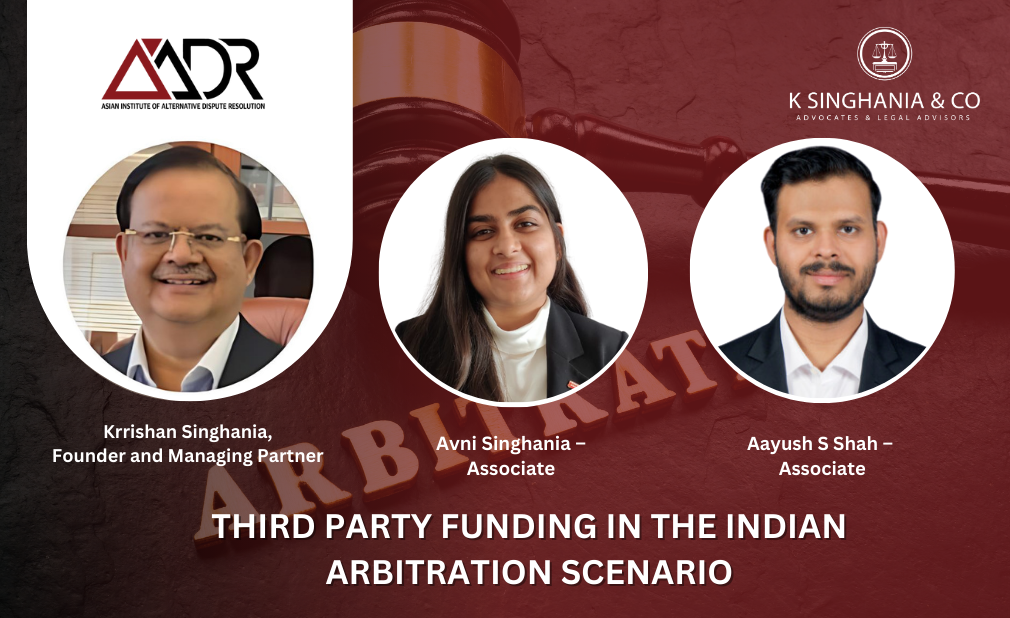Third-party funding (“TPF”) is revolutionizing access to justice, particularly in commercial disputes and high-stakes areas like construction arbitration, where the financial burdens of litigation can be prohibitively high. Under a TPF arrangement, a neutral and unrelated party provides financial support to one of the disputing parties, covering costs such as legal fees, regulatory procedural fees, expert witness expenses and all other ancillary legal expenses. This funding model not only mitigates financial barriers for claimants but also becomes investment opportunities for financers who receive a portion of the favorable award.
Globally, TPF has evolved as a viable financing model, especially in jurisdictions where legal frameworks now expressly permit it, like Singapore, Australia, United Kingdom, India etc. However, while countries like Singapore have laid the groundwork for regulated TPF, in India, TPF remains relatively unregulated, relying on traditional contractual agreements to set the terms. This article explores the role of TPF in arbitration in India, examining global and Indian perspectives and addressing challenges related to regulation, ethical considerations, and practical implementation.
- Historical and Legal Perspectives on TPF in Key Regions: The Indian Scenario
India’s approach to third-party funding reflects a gradual shift towards acceptance of TPF, which is marked by judicial interpretation and selective legislative amendments. Historically, third-party funding was viewed with caution, given concerns about champerty and maintenance—two doctrines that aimed to prevent unethical profiteering from legal claims. Maintenance is an instance when a third-party having no actual interest, assists in litigation with money or other means to enable either party to a suit to prosecute or defend it.[1] According to the Black’s Law Dictionary, the champerty is an agreement between an officious intermeddler in a lawsuit and a litigant by which the intermeddler helps ascertain the claim of the litigant or party as consideration intended for getting part of any judgment proceeds[2]. However, Indian courts have long maintained a more flexible approach to TPF than many western jurisdictions, allowing funding arrangements under specific conditions only.
2.1. Trajectory of case laws and recognition of TPF by Indian Judiciary
TPF in India was first considered in colonial-era cases, notably in Ram Coomar Coondoo v. Chander Canto Mookerjee.[3] In this landmark case, the Privy Council upheld a funding agreement that allowed a financier to claim a portion of the recovered property, provided it was not “extortionate or unconscionable.” This ruling set an enduring precedent, distinguishing Indian law from English law, where champertous agreements were traditionally deemed void.
Through this judgment the Indian courts thus recognized the utility of TPF, allowing it where it served an equitable purpose and did not exploit the litigant. This early acceptance paved the way for third-party funding agreements in both litigation and arbitration, especially as courts continued to uphold this precedent in subsequent cases. For instance, in the case of Harilal Nathalal Talati v. Bhailal Pranlal Shah[4], the Bombay High Court reinforced that while TPF was legal, agreements that offered disproportionate returns to funders were invalid as “opposed to public policy.”
In the case of Bar Council of India v. A.K. Balaji[5], the Supreme Court of India underscored that while lawyers are prohibited from financing their clients’ litigation, third-party funding by non-lawyers remains permissible. This decision confirmed the judiciary’s favorable stance toward TPF, marking a crucial distinction between third-party financiers and legal professionals. As a result, financiers without direct legal involvement can fund disputes, incentivizing investors to explore litigation and arbitration funding in India’s burgeoning dispute resolution market.
In the landmark case of Tomorrow Sales Agency Private Limited v. SBS Holdings, Inc.[6] the Delhi High Court reinforced TPF’s acceptance in Indian arbitration, ruling that third-party funders, if not signatories to an arbitration agreement, cannot be held liable for adverse cost awards. Here, the court distinguished Indian law from English cases such as Arkin v. Borchard Lines[7] and Excalibur Ventures LLC v. Texas Keystone Inc[8] which impose cost liability on funders. This decision underscores the autonomy of funders in Indian arbitration and highlights the judiciary’s cautious approach to imposing cost liabilities.
India’s evolving stance on TPF has encouraged the establishment of several funding firms like LitiCap and Legal Pay, which evaluate cases on their potential for favorable outcomes and manage risk through strategic selection.
2.2. Legislative Amendments and the Road to Regulation
Even though judicial pronouncements of the apex court have recognized TPF as a precedent, it was imperative for an amendment in the legislation to accommodate TPF in India’s legislation.
In some Indian states, amendments to the Civil Procedure Code, 1908 (“CPC”) further validate the role of TPF in civil suits. States like Uttar Pradesh and Madhya Pradesh have updated Order XXV, Rule 1 of the CPC, making it mandatory for courts to order security for costs when a plaintiff is financed by a third party. Similarly, in Tamil Nadu and Orissa, the Code allows for such funding arrangements, provided they are not “opposed to public policy,” mirroring early case law requirements for fair funding.
These amendments, while specific to civil suits, provide a foundation for TPF regulation across different kinds of disputes and States of India and indicate a need for a comprehensive national framework that applies to arbitration as well. With regulatory guidance, India can facilitate TPF within arbitration, potentially clarifying issues around cost allocation, funder involvement, ethical boundaries, and confidentiality issues critical to protecting the rights of the litigants and maintaining integrity of arbitration.
- International Perspective on TPF Regulation
Internationally, TPF regulation varies widely, with jurisdictions such as Singapore leading in formulating structured regulatory frameworks. In Singapore the Civil Law (Amendment) Act 2017 legalized TPF for arbitration, limiting funding to “Qualifying Third-Party Funders” that meet specific financial and ethical criteria. This approach provides a balanced model, ensuring funders’ reliability while protecting claimant rights. Singapore’s regulations mandate disclosure of funding arrangements, promoting transparency in arbitration while addressing ethical considerations.
Singapore’s approach to third-party funding marks a significant step towards in the global acceptance of TPF. With the enactment of the Civil Law (Amendment) Act 2017, Singapore amended its Civil Law Act, 1909 to allow TPF specifically for arbitration proceedings, effective as of March 1, 2017. This was a pioneering move in Asia, reflecting Singapore’s commitment to becoming a leading hub for international arbitration hub.
The Act outlines strict norms guidelines for funders, defining “qualifying third-party funders[9]” stating that their operations are not against public policy.[10] They must meet specific requirements related to their experience, financial capacity, and professional conduct. Only such qualifying entities can offer funding, a safeguard that ensures funders are adequately resourced and have a strong understanding of the arbitration process. These qualifications provide balance by reducing the risks of exploitation or undue influence that might arise from an unrestricted funding market.
Moreover, the amendment in the Civil Law Act restricts TPF exclusively to arbitration, leaving litigation funding outside its scope. This decision reflects a cautious but progressive stance, enabling TPF in scenarios where it aligns with Singapore’s pro-arbitration policy while limiting potential for abuse in other judicial settings. This framework has bolstered Singapore’s as a preferred choice of attractiveness as a venue for international arbitration in Asia, providing disputing parties with confidence in the legitimacy and transparency of TPF.
Whereas in the United Kingdom there is a self-regulatory approach, with the Association of Litigation Funders (ALF) overseeing funder conduct. The ALF’s Code of Conduct requires funders to maintain financial stability, non-interference in litigation strategy, and transparency with claimants.
- Challenges and Ethical Considerations in Third-Party Funding
While TPF offers significant advantages, it also raises critical ethical and operational challenges that if left unaddressed, could affect its credibility and fairness. These challenges are especially seen where cases are typically complex and involve multiple stakeholders, each with potentially conflicting interests.
4.1. Conflicts of Interest and Control over Proceedings
One of the primary concerns surrounding TPF is the potential conflict of interest that arises when a third-party funder becomes involved in the arbitration process. In construction disputes, the funder’s financial stake may incentivize them to influence the litigation strategy or push for specific outcomes that maximize their return. For instance, a funder might prefer an aggressive approach or avoid early settlement negotiations, even if a settlement might be in the best interest of the funded party.
While funders are generally contractually bound not to interfere directly with legal strategies, these provisions are challenging to enforce, and funders often exercise indirect control, such as through approvals for case expenses or strategic decisions. This control can compromise the funded party’s autonomy, creating ethical concerns about impartiality in arbitration.
Many funders bring industry knowledge, which can prove advantageous in strategic planning and pre-arbitration negotiations, making them more than just financial backers. This involvement enables claimants to refine their case strategies, boosting the potential for favorable outcomes. However, this level of involvement also raises concerns around funder influence in litigation strategy. Ensuring that funders do not unduly influence decision-making processes is crucial for preserving the claimant’s autonomy and the arbitration’s integrity.
4.2. Confidentiality and Privilege Concerns
Another issue that is highly pertinent in TPF arrangements is the risk of breaching confidentiality or waiving legal privileges. In arbitration, confidentiality is a cornerstone, especially in construction disputes where proprietary data, engineering plans, and financial details are typically involved. Sharing information with a third-party funder can inadvertently risk these confidential details, and in some cases, courts may even determine that attorney-client privilege is waived once sensitive information is shared with an external funder.
The complexity of construction arbitration heightens the risk, as funders often require extensive access to case details to evaluate the investment’s viability. For TPF to remain sustainable, legal frameworks will need to define clear boundaries regarding the handling of confidential information between funders, legal teams, and claimants to preserve privilege and protect sensitive data.
To address this, globally TPF agreements are often structured to limit funder access to only necessary documents, and communication between funders and claimants, and the claimant is protected by litigation privilege. However, as the use of TPF expands, formal regulations around confidentiality and privilege in arbitration are needed to ensure consistency in how funders and claimants handle privileged and confidential information.
4.3. Unregulated Fee Structures and Fairness
Fee structures in TPF are generally contingent, meaning that the funder is compensated based on the arbitration’s outcome. However, if these structures are not regulated, funders may impose disproportionately high fees or claim substantial portions of the award, leaving the funded party with less than expected. This is particularly critical in arbitrations where costs tend to escalate, and the financial stakes are already high.
India currently lacks statutory guidance on what constitutes a fair fee structure for TPF, and this gap could lead to exploitative practices. Drawing from cases like Harilal Nathalal Talati v. Bhailal Pranlal Shah[11], the Indian judiciary may consider fee agreements unconscionable if they are excessively disproportionate. However, without specific regulations, parties must rely on court discretion, which may vary and add to uncertainty in dispute financing. This points out to a need of regulatory framework through acts or rules by administrative authorities that supervise the fee structure and deter it from being disproportionate.
4.4. Ethical Challenges in Contingency Models and Lawyer Involvement
While TPF allows access to justice, it also raises ethical issues, especially in jurisdictions where contingency fees are prohibited for lawyers. In India, for instance, lawyers cannot take cases on a contingency basis, meaning they cannot directly benefit from a favorable outcome. However, TPF may indirectly impact legal representation if funders push lawyers toward specific strategies or align their interests with the funder rather than the client.
To address this, some jurisdictions, like the United Kingdom, have adopted self-regulatory guidelines mandating minimal interference by funders in case strategy. While Indian law does not yet recognize this model, adopting similar guidelines could help manage the ethical dimensions of TPF, aligning funders’ interests with the client’s goals and maintaining the independence of legal counsel.
4.5 Cross-Border Third Party Funding
When a third party funder is investing in another country, respective foreign exchange laws will also be applicable in addition to the already binding ones. In case of India, the Foreign Exchange Management Act, 1999 (FEMA) comes into play when there are investments or funding from other jurisdictions in India. The FEMA does not explicitly put a bar on TPF in India, neither does it classify it, nor there are, at present, any RBI guidelines in support or prohibition of the same. The FEMA classifies transactions as Capital Transactions[12] and Current Transactions.[13] With a bifurcation in the type of transactions, each transaction is treated differently under the Act. The treatment of TPF under FEMA would be based on the type of transaction it is treated as. If the TPF is a Current Account Transaction, it will be allowed unless the FEMA prohibits or controls it.[14] To the contrary, if TPF is being classified as a Capital Account Transaction, if specifically permitted, the FEMA generally prohibits it.[15] There exists a legal vacuum due to the absence of any RBI regulation being specific to TPF or the FEMA laying down the recourse to regulate it.
- Recommendations for a Balanced TPF Framework in India
To harness the full potential of TPF while addressing the ethical and operational challenges it presents, India should consider implementing a balanced regulatory framework. This framework could enhance transparency, protect parties’ interests, and promote ethical practices in construction arbitration. Here are a few recommendations that can guide the development of such a framework:
5.1. Establishment of Regulatory Guidelines
India should establish comprehensive regulatory guidelines for TPF that outline the qualifications of third-party funders, permissible funding arrangements, and transparency requirements. Drawing inspiration from the Singapore Civil Law (Amendment) Act 2017, which mandates the registration of qualifying funders and imposes obligations on them, India can create a framework that ensures funders operate within defined legal boundaries. Such regulations could include:
- Registration Requirements: where only registered funders should be allowed to finance litigation or arbitration, ensuring they meet established financial and ethical criteria;
- Disclosure Obligations: where Funders should be required to disclose their financial interests and fee structures clearly to the funded parties and their legal counsel, enabling informed decision-making. It may also be beneficial to disclose such information to the Arbitrator.
5.2. Ethical Guidelines for Funders and Lawyers
The introduction of ethical guidelines that govern the relationship between funders, legal representatives, and clients is crucial. These guidelines should address issues such as:
- Non-Interference in Legal Strategy: Clearly outline that funders should not interfere with or control the litigation strategy of funded parties;
- Protection of Confidentiality: Ensure that all parties understand the implications of sharing information with funders, promoting practices that safeguard confidentiality and privilege.
5.3. Enhanced Transparency and Fairness in Fee Structures
To prevent exploitative practices, India must implement regulations that ensure fairness in TPF agreements, particularly concerning fee structures. This could involve:
- Caps on Fees: Establishing maximum limits on the percentage of awards that funders can claim, which could protect funded parties from excessive financial burdens.
- Standardized Fee Models: Developing standardized fee models that funders can adopt, providing clarity and predictability to the parties involved.
5.4. Training and Education for Legal Practitioners
As TPF becomes more prevalent, legal practitioners must be equipped to navigate its complexities. Ongoing training programs should be instituted to educate lawyers on:
- Best Practices for Engaging with Funders: Providing guidance on how to engage with funders while maintaining professional independence and upholding client interests.
- Understanding TPF Structures: Educating lawyers about different TPF structures, potential implications, and ethical considerations to better advise their clients.
5.5. Judicial Guidance and Timely Resolution of Disputes
The judiciary plays a crucial role in shaping the TPF landscape. Courts should focus on:
- Proactive Case Management: Adopting proactive case management techniques to handle arbitration challenges and TPF-related disputes swiftly, ensuring that the interests of all parties are balanced and protected.
- Clarifying Legal Precedents: Providing clear legal precedents on TPF to guide future agreements and mitigate ambiguities, thus fostering a more predictable legal environment for funding arrangements.
As India is at a stage where it is considering regulatory models for TPF, Singapore’s legislation could serve as an example, particularly for ensuring that funders do not interfere excessively in case of strategies for resolving disputes. This would maintain the claimant’s control over their own case while allowing funders to invest in dispute resolution with defined expectations and responsibilities. However, the regulations shall be formulated, not only to restrict the funder’s involvement but also ensure that their interests are well protected.
Conclusion
As TPF continues to gain traction within the Indian legal landscape, it is imperative that the country develops a balanced and robust framework to govern its application in arbitration. By addressing ethical concerns, promoting transparency, and establishing regulatory guidelines, India can create an environment where TPF serves as a catalyst for greater access to justice and fair resolution of disputes. A thoughtful approach to TPF not only aligns with international best practices but also bolsters India’s position as a viable forum for global dispute resolution.
In conclusion, the evolving nature of TPF presents both opportunities and challenges. By adopting a proactive and thoughtful regulatory stance, India can ensure that TPF contributes positively to the legal landscape, fostering an atmosphere of fairness, equity, and accessibility of justice.
[1] Meena R.L., ‘Textbook On Contract Law Including Specific Relief’, 1st edition, Universal Law Publishing 2008
[2] Bryan A. Garner, Black’s Law Dictionary, 9th edition, West 2009.
[3] (1877) ILR 2 Cal 233.
[4] AIR 1940 Bom 143.
[5] AIR 2018 SC 1382.
[6] 2023 SCC OnLine Del 3191.
[7] [2005] 1 WLR 3055.
[8] [2016] EWCA Civ 1144.
[9] Section 5B(10), Civil Laws Act, 1909
[10] Section 5B(2), Civil Laws Act, 1909
[11] AIR 1940 Bom 143.
[12] Section 2(i), Foreign Exchange Management Act, 1999.
[13] Section 2(j) Foreign Exchange Management Act, 1999.
[14] Section 5, Foreign Exchange Management Act, 1999.
[15] Section 6, Foreign Exchange Management Act, 1999.






